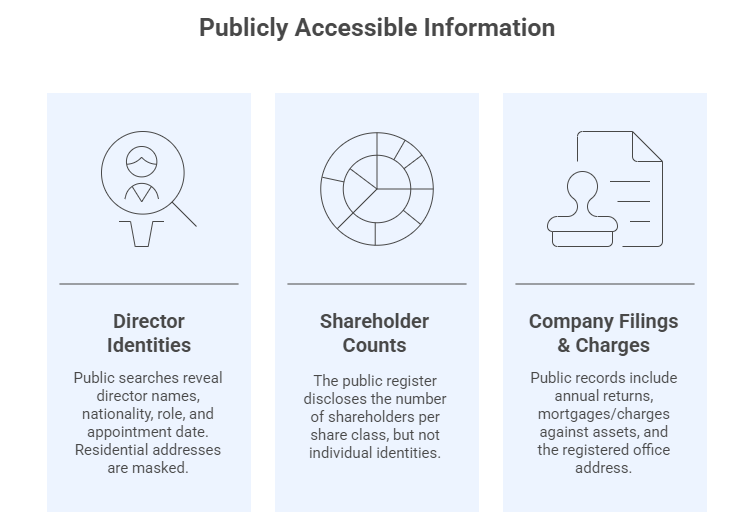Hong Kong’s reputation as a global financial hub hinges on its transparency and robust regulatory framework. Yet for businesses conducting due diligence, understanding what director and shareholder information is publicly accessible—and what remains protected—is critical. Missteps can lead to legal violations or incomplete risk assessments. Here’s what international stakeholders need to know.

Publicly Accessible Information: Where Transparency Prevails
1. Director Identities (Section 641, Companies Ordinance)
Every Hong Kong company must register director details with the Companies Registry (CR). Public searches reveal:
- Full names
- Nationality
- Role (e.g., executive/non-executive director)
- Appointment date
Example: Searching “ABC Limited” lists all current directors but masks residential addresses.
2. Shareholder Counts (Not Names)
While the public register discloses the number of shareholders per share class, it does not list individual shareholder identities. Only these appear:
- Total issued shares
- Share class breakdown (ordinary/preferred)
- Changes in capital structure
3. Company Filings & Charges
Public records include:
- Annual returns (financial summaries, not full reports)
- Mortgages/charges against assets
- Registered office address
⚠️ Key Limitation: Shareholder names remain confidential unless voluntarily disclosed in annual returns (rare).
Protected Information: Legal Barriers Explained
1. Residential Addresses & ID Numbers (Sec. 54)
Directors’ residential addresses and full ID/passport numbers are legally shielded from public inspection. The CR replaces these with:
- A “correspondence address” (often the registered office)
- Partial ID numbers (e.g., “A123**”)
2. Beneficial Ownership Registers
Though Hong Kong complies with FATF anti-money laundering standards, beneficial ownership data is not public. Only law enforcement and regulators access this via:
- The Significant Controllers Register (SCR) held privately by companies
- Statutory requests (Sec. 51/58) requiring court approval
3. Consequences of Illegal Access (Sec. 65)
Unlawfully obtaining protected data (e.g., via hacking, bribery) carries penalties:
- Fines up to HK$150,000
- Imprisonment for 2 years
- Civil liability for damages
Legal Workarounds: How to Access Restricted Data
1. Statutory Declarations (Sec. 51/58)
Parties with “sufficient interest” (e.g., creditors, litigants) can apply to courts for disclosure orders. Requirements:
- Proof that correspondence addresses are ineffective
- Evidence linking data to legal proceedings
- Court approval specifying access scope
2. Consent-Based Access
Directors/shareholders may voluntarily disclose data via:
- Notarized consent forms
- Due diligence questionnaires (common in M&A)
3. Regulated Intermediaries
Licensed firms (like corporate service providers) can legally verify protected details through:
- CR’s “registered user” portals (requires compliance certification)
- Client-authorised due diligence requests
Addressing “Hidden Ownership” Pain Points
Many foreign businesses struggle with opaque ownership chains. While Hong Kong law shields personal data, structured approaches mitigate risks:
- Leverage Public Filings: Cross-reference director names with other registries (e.g., land records, litigation databases).
- Engage Local Experts: Use licensed partners to navigate SCR verifications legally.
- Analyze Patterns: Sudden director resignations/share transfers often signal undisclosed risks.
How ChinaBizInsight Delivers Compliant Transparency
Our Hong Kong Director & Shareholder Verification Reports transform fragmented data into actionable intelligence while respecting legal boundaries:
- Legal Director Checks: Cross-referenced CR data with sanction lists and litigation histories.
- Shareholder Analysis: Verified ownership trees via statutory declarations (where permissible).
- Risk Flags: Identification of shadow directors or abnormal capital changes.
✅ Guarantee: All reports adhere to Sections 54 and 65 of the Companies Ordinance—zero illegal disclosures.
Conclusion: Balancing Due Diligence and Compliance
Hong Kong offers greater corporate transparency than many jurisdictions, but its privacy safeguards are equally rigorous. Success hinges on:
- Knowing the exact boundaries of public access (Sec. 641 vs. Sec. 54).
- Using court/consent pathways for sensitive data.
- Partnering with licensed experts to avoid Section 65 violations.
International businesses that navigate this framework gain trustworthy insights—without legal exposure.
🔍 Ready for Legally Compliant HK Reports?
Verify Directors & Shareholders Now
Explore All ChinaBizInsight Solutions
